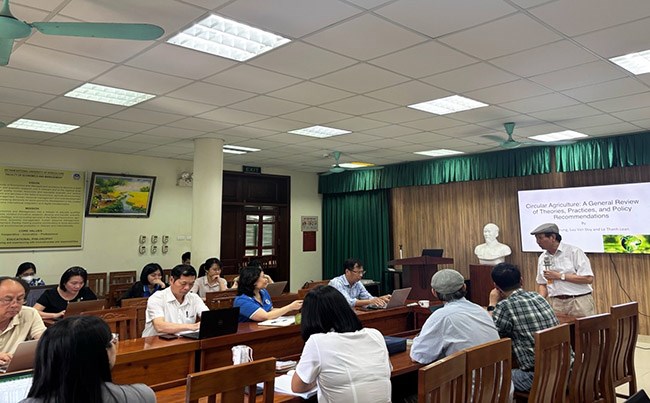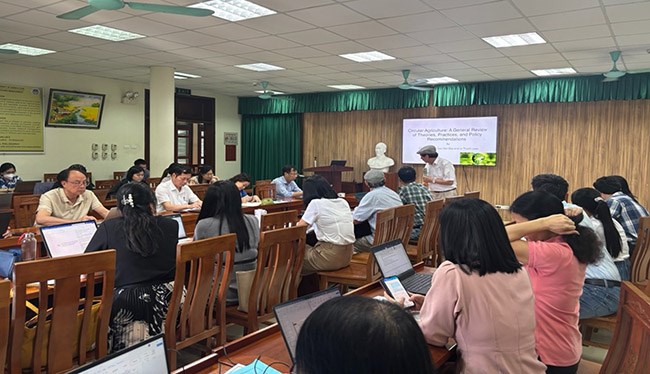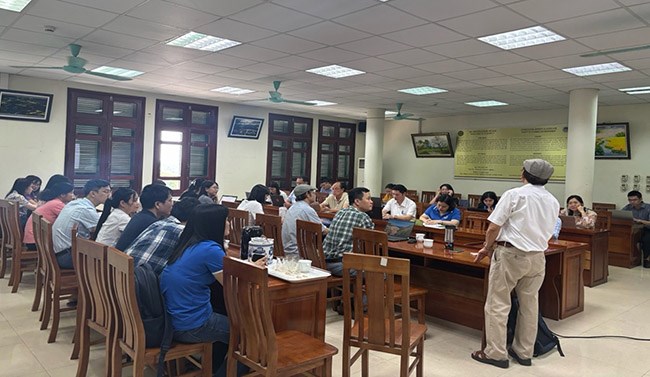Traditional agriculture has been facing numerous challenges, especially in the context of climate change and severe environmental degradation. Transitioning from a conventional agricultural economy to a modern agricultural model is essential to ensure the sustainable development of sectors such as crop production, animal husbandry, aquaculture, and forestry. Based on the synthesis of existing research conducted by both international and Vietnamese scientists, circular agriculture has emerged as a sound and inevitable direction. It is not only a requirement but also a natural trend toward more sustainable and efficient agricultural development.
On May 12, 2025, within the series of activities to celebrate Vietnam Science and Technology Day, Professor Dr. Do Kim Chung, at a seminar organized by the Faculty of Economics and Management, Vietnam National University of Agriculture (VNUA), presented a summary of the research group’s findings on the topic “Circular Agriculture: An Overview on Theory, Implementation Practices, and Policy Recommendations”.
The research highlights that circular agriculture is a closed-loop production system in which resources and by-products from agricultural and business operations are reused, recycled, or transformed into new products. The application of circular agriculture promotes more rational and efficient production processes and resource use. It also helps optimize production chains, thereby minimizing waste and reducing negative environmental impacts.
Research has shown that circular agriculture focuses on promoting the circularity of resources within the agri-food value chain, minimizing external inputs, reducing resource demand, regenerating biological ecosystems, and mitigating environmental impacts in order to meet the growing demand for food and improve the livelihoods of producers. Circular agriculture differs from conventional agriculture in its principles, degree of circularity, evaluation criteria, and the way production and business activities are practiced. Circular agricultural practices have been implemented globally due to their economic, social, and environmental benefits. However, circular agriculture still faces several barriers to widespread adoption. Many producers lack the knowledge and skills needed for waste management and for optimizing circular processes. In addition, infrastructure and technology for implementing circular agriculture remain limited in many localities. Moreover, policies supporting the development of sustainable agricultural production are still insufficient and not truly focused.
To overcome the challenges and difficulties to promote broader and more effective adoption of circular agriculture in the future, Prof. Dr. Do Kim Chung proposed several solutions as follows: (i) Develop a comprehensive strategy for the agricultural sector aimed at advancing circular agriculture. This includes reviewing and adapting the current agricultural development strategy to align with new realities; (ii) Enhance awareness and change behavior among producers and consumers related to circular agriculture and organic products. It is essential to build a system of supportive policies that encourage the public to use sustainable products; (iii) Increase investment in research and development of circular technologies. Policymakers should create favorable conditions for organizations, individuals, and agencies to access support funds and new technologies with ease; (iv) Provide greater incentives to producers to access credit and extension services, and to produce organic products, reuse, and recycle agricultural resources; (v) Strengthen farmer organizations to apply circular farming technologies. In particular, it is necessary to build sustainable supply chains from production to consumption through farmer associations. This will enhance collaboration among stakeholders, facilitate the flexible collection and recycling of by-products, and develop specialized distribution and marketing channels for recycled products.
Some photos of the seminar

Prof. Dr. Do Kim Chung shares his research.

A large number of lecturers, and researchers from the Faculty of Economics and Management attend the seminar.

Lively discussion among participants